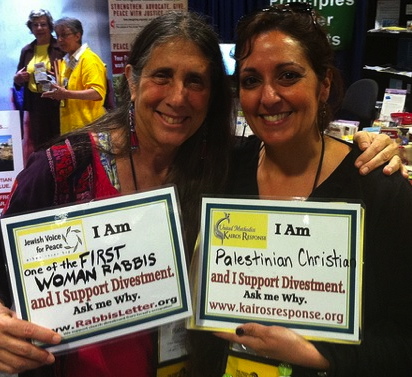 Next week, the Presbyterian Church (U.S.A.) General Assembly will vote on whether or not to divest from companies (Caterpillar, Hewlett-Packard, and Motorola Solutions) profiting from non-peaceful activities in Israel and Palestine. This follows years of debate and dialogue, contact with the companies, and careful studies of “the facts on the ground.”
Next week, the Presbyterian Church (U.S.A.) General Assembly will vote on whether or not to divest from companies (Caterpillar, Hewlett-Packard, and Motorola Solutions) profiting from non-peaceful activities in Israel and Palestine. This follows years of debate and dialogue, contact with the companies, and careful studies of “the facts on the ground.”
The divestment recommendation is based on a principled refusal to participate financially in the illegal occupation of Palestinian Territories (the West Bank, East Jerusalem, and Gaza), which violates international law and makes comparisons with South African apartheid unavoidable. Archbishop Emeritus Desmond Tutu, for example, endorses this occupation-focused divestment as a key form of nonviolent economic pressure. The Friends Fiduciary Corporation (Quakers) recently divested its Caterpillar stock and the major teachers annuity fund TIAA/CREF recently divested its Social Choice Funds from Caterpillar.
Opponents reject divestment (and boycott) in favor of preserving relationships with parts of the Jewish community, and invoke “positive investment” as an alternative to divestment. But these words do not point to a viable investment strategy, nor to a way to end an occupation that continuously expands by taking Palestinian land for Jewish settlements and squeezing non-Jews out of East Jerusalem. While it is understandable to want to avoid conflict with Jewish neighbors and friends, criticism of Israeli government policy is not anti-Semitism which church policy clearly condemns (as it does hatred of Arabs).
___________________________________________
The divestment recommendation is based on a principled refusal to participate financially in the illegal occupation of Palestinian Territories (the West Bank, East Jerusalem, and Gaza), which violates international law and makes comparisons with South African apartheid unavoidable.
___________________________________________
It is possible to support both focused divestment and efforts to find viable investments in Palestinian enterprises, coupling the moral pressure of the former with the development assistance envisioned by the latter. But this would mean recognizing the real obstacles to investment, which are politics first and economics second.
Politically, divestment opponents advocate a words-only approach of expressing concerns that has been tried—and has failed. They confuse the church’s calling to be a truthful place with being a neutral place, and attempt to equate the negotiating position of a long-subjugated people with that of a powerful and prosperous nuclear-armed state. And they ignore the call from Christians in Palestine, who increasingly favor economic pressure and name the occupation as the chief reason for their diminishing numbers. (A mass letter opposing divestment signed by 14,000 Jews does not even mention the occupation.)
In fact, many Presbyterians now calling for divestment have tried to help the Palestinian economy; aiding the tourism industry by group visits; selling crafts and artwork; planting olive trees and aiding agricultural initiatives. While these acts supplement some incomes and build relationships, they have not slowed the growth of settlements, or prevented the Israeli military and often violent settlers from uprooting thousands of olive trees.
Ultimately the hope of “positive investment” founders on the fact that capital is not the principal Palestinian need. Instead, they need secure property and citizenship rights, freedom of travel, dependable water and energy, an end to the Gaza blockade and fuller access to Area C (the 60 percent of the West Bank under complete Israeli control). A recent study calculated that export and import restrictions and delays, plus higher water, electricity, and land costs, made “production in the PA areas of the West Bank… more expensive by 30 to 40 percent.”
___________________________________________
Ultimately the hope of “positive investment” founders on the fact that capital is not the principal Palestinian need. Instead, they need secure property and citizenship rights, freedom of travel, dependable water and energy, an end to the Gaza blockade, and fuller access.
___________________________________________
Contrast crafts, tourism, and agriculture with the role of the three companies in aiding the occupation that blocks Palestinian development, forcing them inside a massive wall and network of humiliating checkpoints. Armored Caterpillar bulldozers, deemed by an Israeli military commander to be “the key weapon” in the occupation, have demolished Palestinian homes, destroyed parts of Gaza, and constructed Israel’s land-grabbing separation wall. Hewlett-Packard biometric security equipment and Motorola Solutions surveillance and motion-detection equipment guard settlements and are integral to imprisoning the Christian and Muslim population.
Divestment’s impact is not primarily financial but affects the reputation and legitimacy of those benefitting from illegality. Vigorous opposition to divestment by the Israeli government and its supporters indicates a real fear of being associated with the oppression of Palestinians, affirming that divestment carries an effective message that justice is needed. The dangers with “positive investment” are that it accepts or enables the constant shrinkage of Palestinian land and resources, it may depend upon and benefit Israeli intermediaries, and it substitutes charity for justice.
Divestment would be a refusal by the church to stay stuck in the same political impasse that immobilizes the U.S. government, damaging the U.S. reputation around the world. It is a tough moral choice, but sometimes obeying Christ means making such a choice and standing with the weak. It is also a very “positive” choice, affirming that God is sovereign over our economic resources, and that there should be no wall of separation between our morality and finances.
Divestment cannot solve all Palestine’s problems, but it is part of the church’s own integrity that its investments contribute to peace with justice. As the window for a two-state solution closes, divestment is one of the few nonviolent ways left to support freedom for Palestine.
Join the conversation and follow the debate on Unbound!
Presbyterians: Sign this petition in support of divestment.
 The Rev. Dr. Christian Iosso is the Coordinator of the Advisory Committee on Social Witness Policy of the Presbyterian Church (U.S.A.) and the General Editor of Unbound. His Master of Divinity comes from Princeton Theological Seminary and his Ph.D., from Union Theological Seminary in New York City. He served as pastor of the Scarborough Presbyterian Church in Briarcliff, NY, from 1992–2005.
The Rev. Dr. Christian Iosso is the Coordinator of the Advisory Committee on Social Witness Policy of the Presbyterian Church (U.S.A.) and the General Editor of Unbound. His Master of Divinity comes from Princeton Theological Seminary and his Ph.D., from Union Theological Seminary in New York City. He served as pastor of the Scarborough Presbyterian Church in Briarcliff, NY, from 1992–2005.





Unbound Social